Iran’s Security Chief Says Sanctions Render JCPOA 'An Empty Shell'
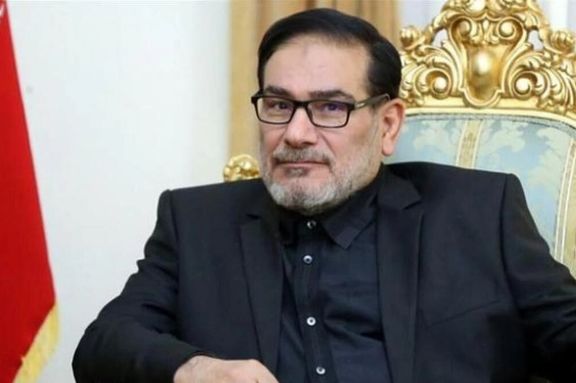
Iran's national security chief says the United States and its European allies have failed to live up to their commitments under the 2015 deal, rendering the JCPOA an empty shell.

Iran's national security chief says the United States and its European allies have failed to live up to their commitments under the 2015 deal, rendering the JCPOA an empty shell.
Ali Shamkhani wrote in a Persian tweet on Wednesday that the nuclear deal between Iran and the world powers did not bring about any economic benefits for Iran or lift sanctions on the country.
He added that the Islamic Republic will not engage in any negotiations with “oath-breaker America” and “idle Europe.”
As the Iranian negotiating team is engaged in bilateral and multilateral talks with the participants of the Vienna talks, Shamkhani has been sounding negative about the negotiations in recent days and insisting on the removal of all sanctions imposed since 2018 when former US president Donald Trump left the JCPOA.
Shamkhani said last week, “Previous experience has shown that without effective lifting of sanctions, sustainable economic benefits from JCPOA are an illusion.”
The Biden Administration has indicated it is willing to lift nuclear-related sanctions imposed since 2018, but Iran is demanding the removal of other sanctions related to human rights, banking and export violations.
While officials say the eighth round of the Vienna talks is in its concluding stages, another meeting was held Tuesday night between Iranian negotiators, the European Troika, and the representative of the European Union.
Iran’s chief negotiator Ali Bagheri also held a bilateral meeting with the EU coordinator for negotiations Enrique Mora.
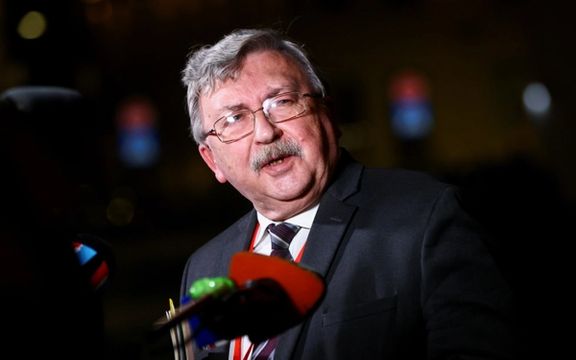
Iranian commentators have been expressing concern about the impact of the Ukraine-Russia crisis on Iran's nuclear negotiations with world powers in Vienna.
Mohsen Jalilvand has said in an interview with Aftab News website that Iran might fall victim to the Ukrainian developments and stressed that the only way to prevent this is holding direct talks with the United States rather than counting on Russia as a mediator between Tehran and Washington. Meanwhile, Jalilvand warned that Russia might take advantage of the situation.
The commentator agreed with Aftab News that a Russian attack on Ukraine seems to be inevitable and such an attack can leave a destructive impact on the Islamic Republic's diplomacy in Vienna. He said that Belarus, China and Iran support Russia in the conflict with Ukraine.
Jalilvand said that a war in Ukraine will lead to the total collapse of the negotiations in Vienna. He added that Russia might also use the Iran card in Vienna adding that "Russia might sell Iran out for concessions."
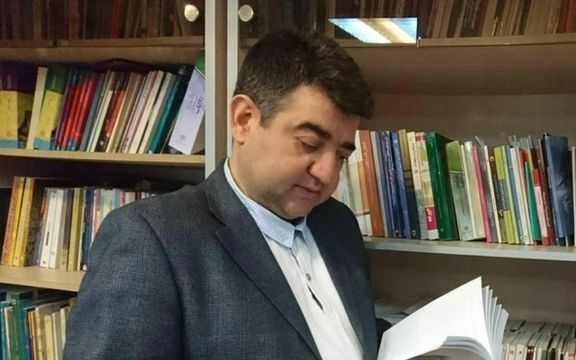
Meanwhile, Foreign Policy Commentator and former diplomat Kourosh Ahmadi said in an interview with Entekhab news website that the United States might soften its position in the Vienna negotiations to have more time to focus on the possibility of a Russian attack on Ukraine.
But he disagreed with Jalilvand on how far a Russian attack can impede talks in Vienna. He said the impact of the Ukrainian crisis on the nuclear negotiations is likely to be minimal and lead to minor disruptions and delays. He added that both the United States and Russia have said before that they have shared interests in the revival of the JCPOA.
Ahmadi reminded that the 2014 occupation of the Crimea took place in the middle of Iran's nuclear negotiations with the P5+1. But the overall impact on the negotiations was minimal. "Whatever Moscow's position, it cannot have a determining impact on the nuclear talks.," Ahmadi said.
Ahmadi said that it is unlikely that the Ukrainian crisis would lead to an all-out classic war. "It is more likely to be a limited operation like what happened in 2014, and not like the occupation of Afghanistan in 1979," he said.
Furthermore, he doubted that Iran would openly support such an attack, reminding that Tehran has not endorsed the 2014 Russian occupation of the Crimea.
He added that "if Iran and America have the political will to come to an agreement, other JCPOA member states can only be facilitators. Otherwise, they will be marginalized. On the other hand, Russia cannot afford not to be part of a possible agreement in Vienna." Ahmadi added that during the past three months Russia has always tried to moderate Iran's positions in Vienna.
In another development, reformist website Zeitoon quoted the former head of the Iranian Parliament's National Security and Foreign Relations committee Heshmatollah Falahatpisheh as saying that the Russians are using Iran as a “barrier” in their confrontation with the West over Ukraine.
Falahatpisheh said: "Based on its interests, Russia is using Iran as a barrier in its confrontation with the United States. Moscow is likely to sell the JCPOA for Ukraine. However, Iranian officials wrongly believe that China and Russia are Iran's strategic allies. This comes while strategic alliance does not mean anything in today's world."
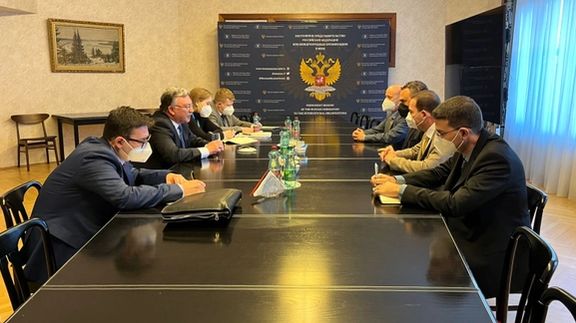
Russian envoy in Iran nuclear talks Mikhail Ulyanov has said that in his meeting with a visiting Israeli delegation in Vienna there was no discussion over Iran.
In an interview with Iran International TV, Ulyanov said that the two sides “disagree on the JCPOA, so there was nothing to discuss” about the Iran nuclear talks.
The Russian envoy, who has taken an active role in the Vienna negotiations, said “We discussed the UN Conference on WMD-Free Zone in the Middle East, where all other regional states participate, except for Israel.” He added, “We maintain regular dialogue with Israeli counterparts.”
The Israeli delegation, headed by Joshua Zarka, the foreign ministry’s deputy director general for strategic affairs, met Tuesday with Ulyanov, Russia’s top negotiator in the Vienna talks, and Monday with Rafael Grossi, director-general of the International Atomic Energy Agency (IAEA).
The visit by the Israeli delegation was seen as an attempt to gauge the state of the talks as diplomats insist the process in its final and critical stage. The United States has warned that time is running out if an agreement is not reached soon.
Israel opposes the revival of the JCPOA, which it believes would be insufficient to stop Tehran from acquiring nuclear weapons and would result in the removal of US sanctions, giving Iran a financial lifeline.
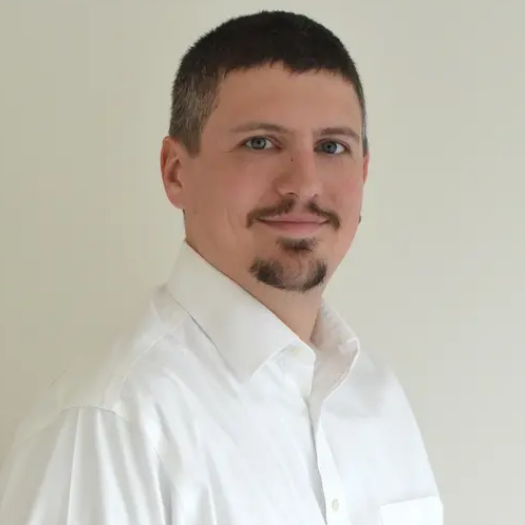
Over a month after Richard Nephew left the US negotiating team in Vienna, he has published a series of tweets to elaborate on the reasons behind his move.
Nephew, who is known as the architect of Washington’s sanctions on Iran, was serving as the deputy to US especial envoy to Iran Robert Malley until December 6, when he left the US negotiating team along with two others, over what was reported as differences with Malley at the time.
In a series of tweets on Tuesday, Nephew said he stepped down from his post “due to a sincere difference of opinion concerning policy”, adding that he no longer serves in the State Department since last week and intends to return to academia.
“Although my views and record have been and continue to be mischaracterized by quite a few people, I do not intend to convey any further details at this time or in public, given the ongoing nature of discussions in Vienna”, he added.
Advocating a tougher posture, Nephew, along with two other US negotiators, left the team because the Biden administration failed to achieve a more assertive approach in the talks, the Wall Street Journal reported.
Nephew, who is a non-resident Senior Fellow at the Brookings Institution, published a book about the sanctions in 2017, titled The Art of Sanctions: A View from the Field.
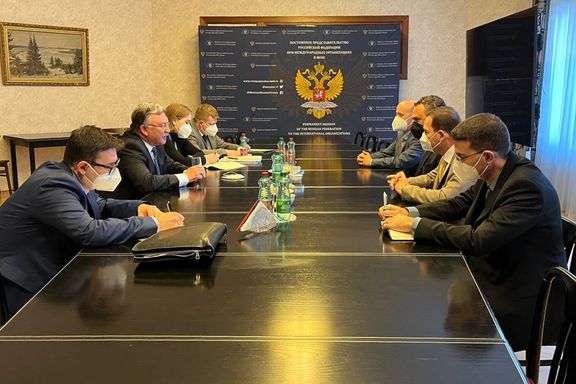
Israel has sent officials to Vienna to meet participants in talks trying to revive the 2015 Iran nuclear deal, which Israel has opposed.
Nour News – an official Iranian outlet affiliated to the Supreme National Security Council –tweeted that “the overt and unexpected presence of the Zionists in Vienna is undoubtedly a deterrent to progress in the current sensitive situation.”
The Israeli delegation, headed by Joshua Zarka, the foreign ministry’s deputy director general for strategic affairs, met Tuesday with Mikhail Ulyanov, Russia’s top negotiator in the Vienna talks, and Monday with Rafael Grossi, director-general of the International Atomic Energy Agency (IAEA). Although Israel is a member of the IAEA, its nuclear arsenal is not subject to IAEA monitoring as Israel is not a signatory of the Nuclear Non-Proliferation treaty.
Ulyanov played down the significance of Zarka’s trip, tweeting that he had met with “Israeli colleagues from the capital and their Permanent Mission in Vienna” to discuss issues related to the IAEA. Russia has long called on both Iran and the US to return to the JCPOA.
Zarka tweeted in reply: “Thank you for a frank and important discussion.”
The Israeli delegation also met the United States Special Envoy on Iran Robert Malley, who leads a US delegation taking part indirectly in the Vienna talks, as well as representatives from China, France, UK, and Germany.
“Zarka went to Vienna to check what is cooking,” a senior Israeli official told the Axios website. “He met everyone other than the Iranians."
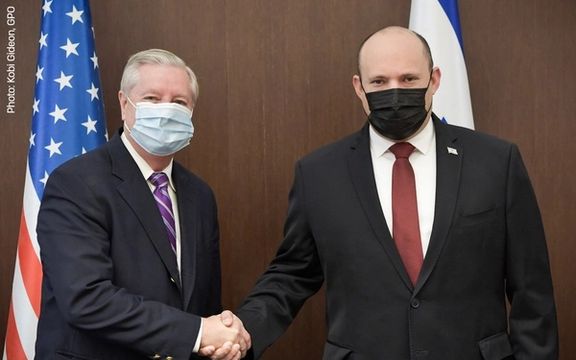
Visiting Israel Monday, United States Republican Senator Lindsey Graham compared Iranians to the Nazis and said they “cannot be ignored.”
Graham repeated his attacks on negotiations underway between Iran and world powers in Vienna to renew the 2015 Iran nuclear program. “When it comes to the Iranian nuclear program, guardrails are missing around Iranian nuclear ambitions”, Graham said, calling for “red lines” over Iran’s stockpile of enriched uranium, ‘weaponization’ of that stockpile, and ability to ‘deliver’ potential weapon.
A supporter of former President Donald Trump withdrawing the US from the 2015 agreement, the JCPOA (Joint Comprehensive Plan of Action), Graham said that while the crisis in Ukraine, or China’s relationship with Taiwan were “important, consequential moments in history… the one we’re not talking about enough is even more consequential: that the Iranians break out and acquire nuclear capability.”
While Russia and China were “rational” if “thuggish,” Graham said, “Iran is a theocracy motivated by religion [Shia Islam] that compels them to purify their faith and have the world submit. The Nazis wanted a master race, and the Iranians want a master religion. People like that cannot be ignored.”
‘There will be war’
Graham then evoked the Nazi holocaust: “I guarantee you the Jewish people can’t live that way…One Holocaust was enough. There will be war. Why can’t Iran have nuclear weapons? Because Israelis say, ‘Never again.’”
As some Israelis pointed out on social media that former top Israeli security and defense officials had supported the JCPOA, Graham met with Prime Minister Naftali Bennett, Foreign Minister Yair Lapid, Defense Minister Benny Gantz, and former premier and close Trump ally Benjamin Netanyahu, who faces a raft of corruption charges.
“I mentioned the idea of formalizing a mutual defense agreement, in very limited circumstances that would involve existential threats to the Jewish state [Israel],” Graham said. “What I’m trying to say is that I want a clear message to be sent in the 21st century, that destruction of the Jewish state means war with the United States.”
Netanyahu discussed a possible defense agreement with Trump in 2019 but Gantz opposed the idea as a departure from Israeli security policy. Rights group Amnesty International recently called for a halt in the US’s substantial arms sales to Israel.
On Friday, Democrat Bob Menendez and Graham introduced a bipartisan resolution that would ‘allow’ any Middle Eastern state access to nuclear fuel if they agree not to enrich or reprocess uranium. As a signatory of the Nuclear Non-Proliferation treaty Iran has the right to enrich uranium for peaceful purposes under international inspections but restricted the program under the JCPOA. Israel maintains a nuclear arsenal outside the NPT without international monitoring.